|
|
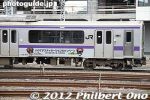
Hiraizumi in Iwate Prefecture was designated as a World Heritage Site in 2011, announced soon after the March 11, 2011 Tohoku disaster.
|
|
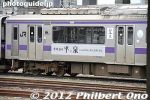
Hiraizumi's two main attractions are Chusonji temple (famous for Konjikido Hall covered with gold leaf) and Motsuji temple's garden.
|
|
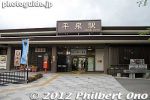
The temples of Hiraizumi are near JR Hiraizumi Station on the Tohoku Line. Hiraizumi is a short train ride from Ichinoseki Station, a shinkansen station.
|
|

Once you arrive at Hiraizumi, the best way to get around is by bicycle. There are a few bicycle rental places near the station. Mail box at Hiraizumi Station.
|
|
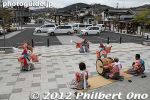
When I arrived on May 2, 2012, this dance troupe danced in front of Hiraizumi Station. The train station has a nice tourist information office where you can pick up maps and pamphlets and directions to bicycle rentals.
|
|
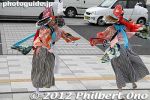
They were so good that I delayed my departure from the train station to watch this.
|
|
|
|
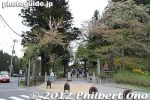
I parked my rental bicycle near this entrance to Chusonji temple grounds.
|
|
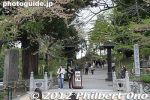
Entrance to the grounds of Chusonji temple. Chusonji belongs to the Tendai Buddhist sect and was founded in 850 by Ennin, a high-ranking priest of Enryakuji Temple on Mt. Hiei in Shiga Prefecture.
|
|
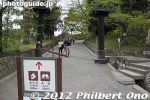
Chusonji is the Tohoku headquarters temple for the Tendai Buddhist sect. About 800 meters to Konjikido Hall.
|
|
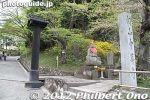
Jizo statue and Chusonji stone sign.
|
|
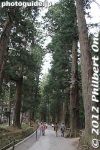
A slight sloping path going to Chusonji temple. It's a nice wooded path.
|
|
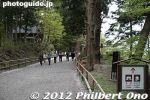
Chusonji was first built in the early twelfth century by the first Ōshū Fujiwara lord, Kiyohira. It became a huge temple complex, but most structures were destroyed by fire in 1337. The famous Golden Hall remains.
|
|
|
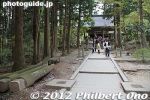
Along the way was this Benkei Hall and a fallen torii.
|
|
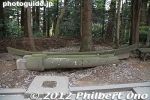
The 3/11 earthquake fell this torii at Benkei Hall.
|
|
|
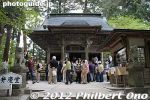
Benkei Hall.
|
|
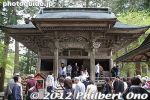
Benkei Hall at Chusonji temple, Hiraizumi.
|
|
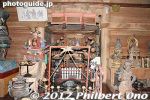
Inside Benkei Hall.
|
|
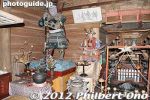
Statue of Benkei in the corner.
|
|
|
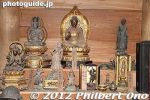
Statues inside Benkei-do Hall at Chusonji temple, Hiraizumi.
|
|

About Benkei Hall.
|
|
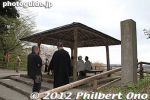
Eastern Lookout deck along the way to Chusonji.
|
|
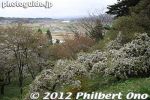
From the lookout point are a few cherry blossoms.
|
|
|
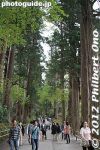
Continuing on the path to Chusonji's Hondo main hall. The main path to Chūson-ji is called Tsukimizaka (Moon Viewing Slope). It is lined with cryptomeria trees planted three or four centuries ago by the Date clan of Sendai.
|
|
|
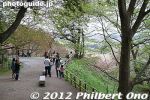
Another scenic lookout point.
|
|
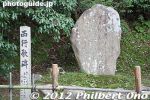
Poem monument for Saigyo (1118-1190), a famous Japanese poet who traveled in the Tohoku area a lot.
|
|
|
|
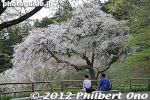
Cherry blossoms at a scenic lookout deck.
|
|
|
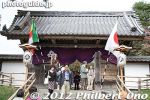
Gate to Chusonji's Hondo main hall.
|
|
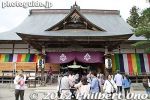
Chusonji's Hondo main hall in Hiraizumi. It was last rebuilt in 1909. Its main object of worship is Amida Nyorai (the Buddha of Infinite Light), flanked by Chūsonji's eternal flames which came from Enryakuji in Shiga Prefecture.
|
|
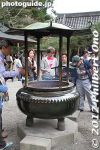
Incense burner in front of Chusonji's Hondo main hall.
|
|
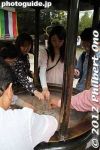
Placing incense into the incense burner in front of Chusonji's Hondo main hall.
|
|
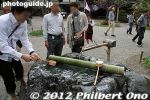
Water fountain
|
|
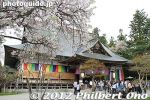
Chusonji's Hondo main hall, Hiraizumi, Iwate Prefecture.
|
|
|
|
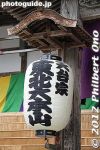
The paper lantern at the entrance of Chusonji's main hall says that it is Tendai Sect's Tohoku Headquarters Temple (Tohoku Dai-honzan).
|
|
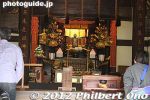
Altar inside Chusonji's Hondo main hall.
|
|
|
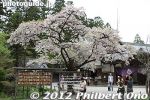
Cherry tree near Chusonji's Hondo main hall.
|
|
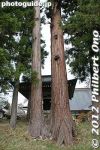
Chusonji's temple bell.
|
|
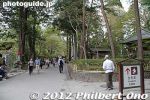
On to Konjikido, 240 meters away.
|
|
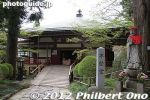
Fudo-do Hall, a prayer training hall. Worships Fudo-myoo. 不動堂
|
|
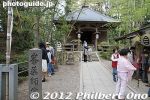
Mine-yakushido Hall. Chusonji has a number of smaller halls of worship. 峯薬師堂
|
|
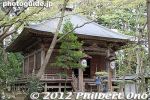
Mine-yakushido Hall worships Yakushi Nyorai. 峯薬師堂
|
|
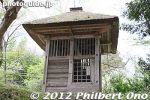
Bonsho temple bell at Chusonji temple. Nice building for the bell. 梵鐘
|
|

About the Bonsho temple bell at Chusonji temple. 梵鐘
|
|
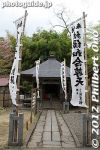
Benzaiten-do Hall 辨財天堂 辨財天十五童子
|
|
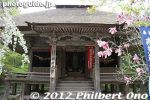
Benzaiten-do Hall worships the 15 male attendants (jugo-doji) who serve the Ugajin deity associated with the goddess Benzaiten. 辨財天堂 辨財天十五童子
|
|

Benzaiten-do Hall 辨財天堂
|
|

About the Benzaiten-do Hall.
|
|
|
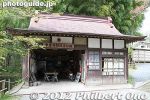
Chusonji's fire dept.
|
|

Up to this point, visiting Chusonji is free. But when you want to see the Konjikido Golden Hall (National Treasure), that's when you have to pay admission.
|
|
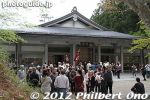
To see the Konjikido Hall, pay admission here at the Sankozo Museum. Admission includes entry to the Golden Hall as well as to Sankozo Museum filled with Chūson-ji's various treasures and cultural objects.
|
|
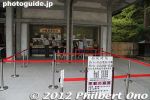
Konjikido Golden Hall admission is 800 yen for adults, 500 yen for high schoolers, 300 yen for junior high schoolers, and 200 yen for elementary school kids.
|
|
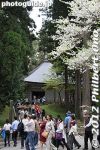
The admission fee includes admission to Konjikido Hall, Sankozo Museum, Sutra Repository, and the Former Konjikidō Shelter Hall.
|
|
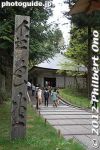
Path to Konjikido Hall, the main attraction of Chusonji temple. 金色堂
|
|
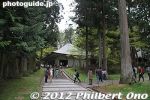
This is the Konjikido Hall building you always see in tourist literature. Doesn't look so impressive as a National Treasure. What you see is only the protective housing for the actual Konjikido Golden Hall sheltered inside.
|
|
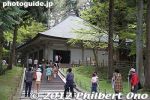
According to an ancient Buddhist prophecy, the world would enter a period of decline called Mappō in 1051. The Tendai sect believed that enlightenment was possible during Mappo only through the veneration of Amida Buddha.
|
|
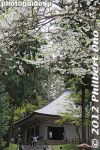
Consequently, the Golden Hall at Chūson-ji was built by the Fujiwara Family to recreate the western paradise of Amida on earth.
|
|
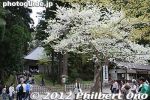
Photography of the Konjikido is not allowed, but you can see photos of it at Chusonji's Web site here.. Konjikido is fenced off.
|
|
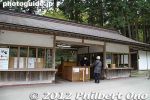
Ticket gate to enter Konjikido Golden Hall.
|
|
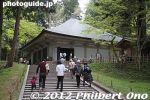
The Konjikido is inside this building sheltering it. They let you into the building one group at a time. There's a short recorded talk about the Konjikido, then you are ushered out of the building to make room for the next group.
|
|
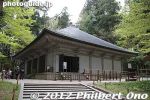
The Golden Hall is indeed gold and beautiful. It's not that big and looks brand new, thanks to restoration work. The gold leaf gleams and shell inlays in the columns are intricate.
|
|
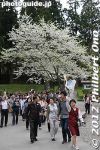
I went during Golden Week so there was a good number of people, but it wasn't horrendously crowded.
|
|
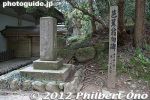
Monument for haiku poet Basho.
|
|
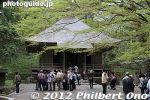
Near the Konjikido is the Kyozo Sutra Repository. 経蔵
|
|
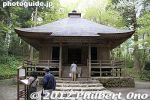
Kyozo Sutra Repository. Important Cultural Property. 経蔵
|
|
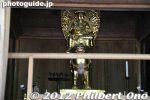
Kyozo Sutra Repository. 経蔵
|
|

About the Kyozo Sutra Repository.
|
|
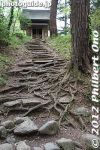
Roots
|
|
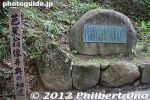
Haiku poet Basho Monument for his Oku-no-Hosomichi series.
|
|
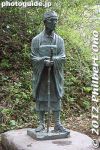
Statue of Haiku poet Basho at Chusonji temple.
|
|
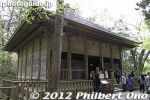
Former housing for the Konjikido Golden Hall, called Konjikido Oido. This building sheltered the Konjikido from 旧覆堂
|
|

About the old housing for the Konjikido Golden Hall, called Konjikido Oido. 旧覆堂
|
|
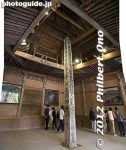
Inside the former housing for the Konjikido Golden Hall, called Konjikido Oido. The Konjikido was housed here until 1963 when the present housing was built. 旧覆堂
|
|

Path to Hakusan Shrine.
|
|
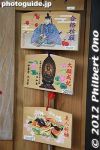
Chusonji votive tablets.
|
|
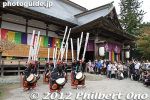
While walking back and passing by the Hondo main hall, I found this group dancing in front of the Hondo hall.
|
|
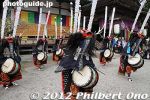
Taiko drum dance by eight men dressed as fierce-looking deer-lion with tall antlers and a mane.
|
|
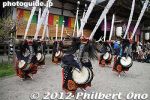
The dance is called Gyozan-ryu Tsunogake Shishi Odori or Gyozan School Antlered Deer Dance. They sing in Buddhist tones. They perform here annually on May 2.
|
|
|
|
|
|
|
|
|
|
|
|
|
|
|
|
|
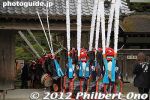
Great dance. Enjoyed it very much. Be sure to see my video.
|
|

My video of the antlered deer dancers at Chusonji.
|
|
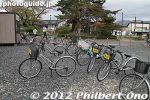
Rental bicycles near Chusonji.
|
|
|
|